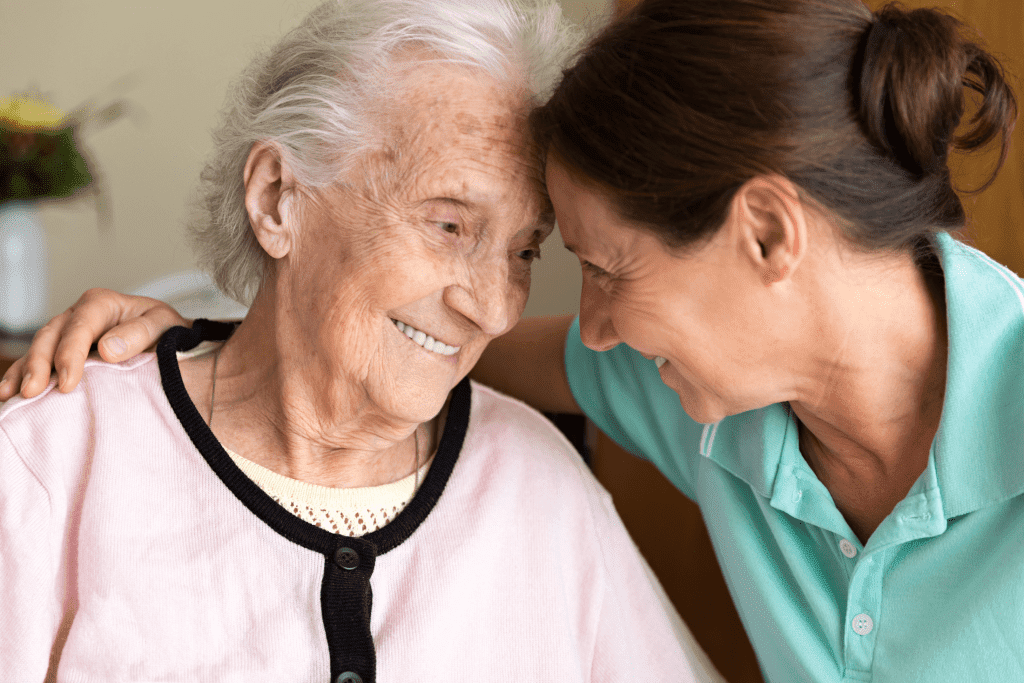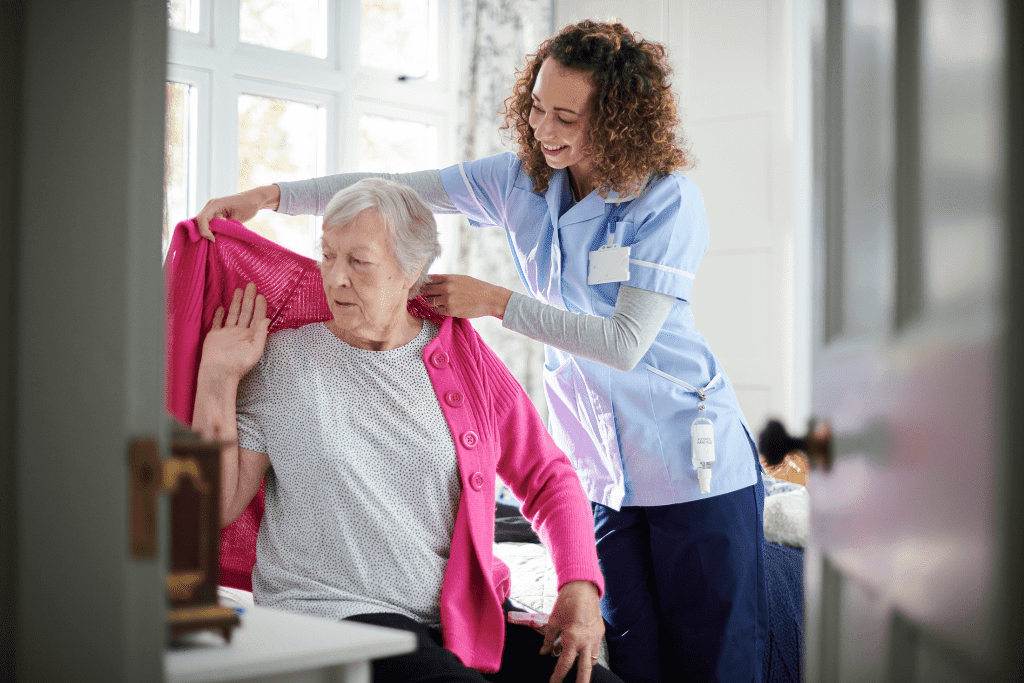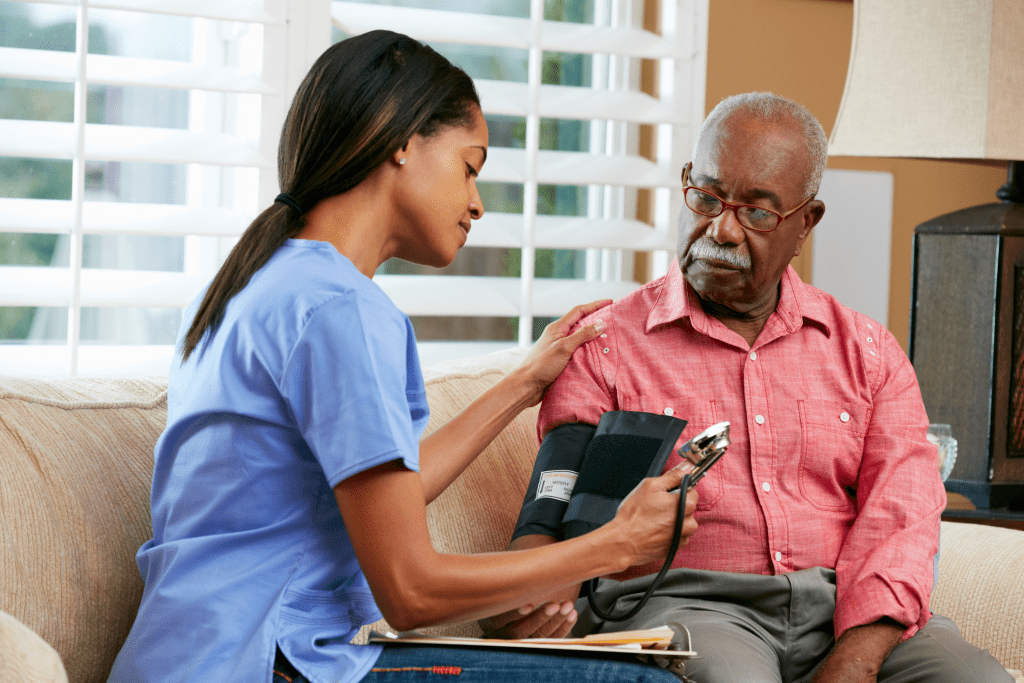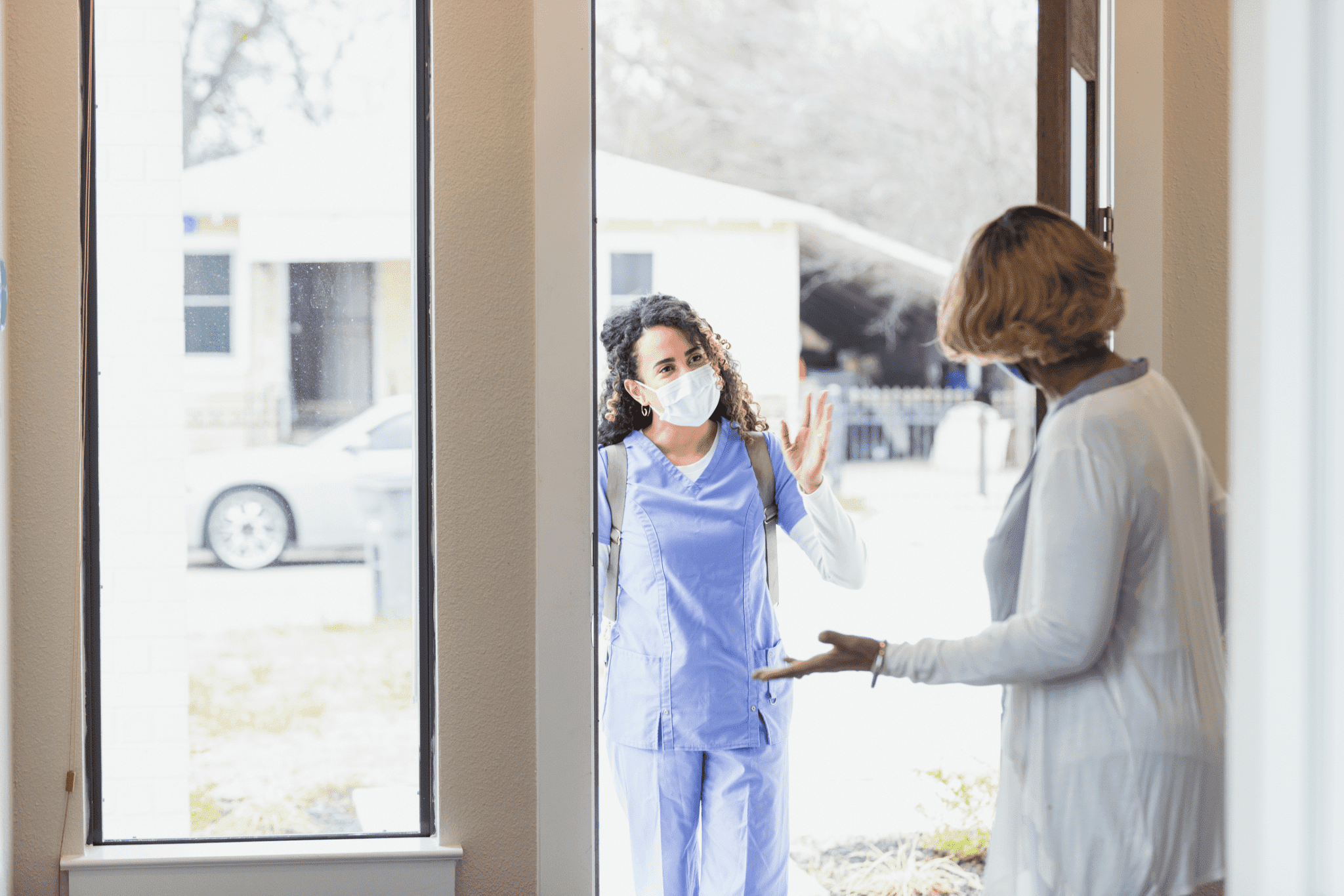Older people generally prefer to age in place. They try to stay active, independent, and energetic as long as they can. However, there comes a time when you see a decline in their health and lifestyle, and they gradually become too weak to comb their hair, hold a spoon to eat, or go to the toilet.
If your elderly loved ones are having difficulties meeting their own needs, you might be considering in-home nursing care to help them with their personal and medical needs in the comfort of their homes.
The question is, who should you hire to provide nursing services at home, a home caregiver or a home care nurse? While these terms are often used interchangeably, their services are entirely different. How? Let’s find out.

What Is Home Care Nursing?
Home care nursing involves all forms of professional support that elderly people need to carry out their day-to-day activities in their own homes.
Home Care Nursing is typically categorized into two categories:
- Personal/home care; provided by caregivers
- Home Health/Nurse Care; provided by registered home care nurses (RN)
Home care nursing reduces the cost of nursing homes, senior living, and hospitals. It also provides respite for the caregiving family. The patient gets complete care including medical assistance without going anywhere.
Unlike other types of senior care, like assisted living or nursing homes, home care nursing is flexible. Depending on the patient’s needs, you can use the service whenever you want. For example, you can hire a caregiver for a couple of hours while you are away for a meeting, or you can hire a nurse for a 15-minute IV administration. Some people hire home care nursing 24/7 sometimes for months and years.
Who is a Home Caregiver?
A home caregiver, also known as in-home care nursing, is a trained professional who provides non-medical support to older clients and patients through personal care and companionship.
When elderly people are unable to sustain their activities of daily living (ADLs) and independently perform their home chores without additional help, a home carer or caregiver can assist them in the comfort of their homes.
The responsibilities of a caregiver include assistance with the following:
- ADLs (activities of daily living)
- Movement and transfers
- Reminders for medication
- Housekeeping
- Grooming
- Personal Hygiene
- Toilet Hygiene
- Companionship
- Socializing
- Shopping and errands
- Transportation
Caregivers can be engaged for as long as needed depending on the requirements of the patient or client. Some patients might need caregivers for a shorter duration only, such as during the recovery from an injury, trauma, or a disease. Others suffering from chronic or terminal illnesses might need caregivers indefinitely.
Family members often hire caregivers for respite care when they have to go away from home for work or other commitments but cannot leave their elderly loved ones on their own. Respite home care is temporarily hiring caregivers or home nurse care when family caregivers are on a break.

How is a Home Caregiver Different From a Home Care Nurse?
Home care nursing is often confused with the services provided by a registered nurse. The term “nursing” refers to both non-medical and medical caregiving to elderly patients. Both home caregiver and home care nurse provides nursing care in the home.
The main difference is that the caregiver helps predominately with personal care and can offer companionship while the home care nurse can provide some generalized medical help.
Let’s have a look at some more differences between a caregiver and a registered home care nurse:
| Home Caregiver | Home Care Nurse |
|---|---|
| Also called Personal Care Attendant and Caregiver | Also known as Home Health Care |
| Provides an extended range of non-medical services
May assist with medication reminders Help with other personal tasks like, housekeeping, companionship, and grooming |
Help with medication referrals to physician and does not help with other personal tasks like ADLs, housekeeping, companionship, and grooming |
| Doesn’t provide any medical help | Provide professional medical support |
| Can be hired through a home help agency | Referred by the doctor |
| Not usually included in health insurance plan | Covered by health insurance |
| Home caregivers can be for a longer duration, especially in chronic or terminally ill patients | In-home RN care is for a short time, mostly during the recovery phase of patients. |

How Do You Know When You Need a Caregiver or a Nurse for In-Home Care Nursing?
While older people prefer staying at home instead of care homes or assisted living, they may still need some extra help with their personal and medical care. Although signs and symptoms indicating the need for nursing care in the home vary from person to person, there are some common triggers and warnings that make the need quite obvious.
The level of care and attention required by the elderly can be mentally and physically exhausting for family caregivers. Family members may become stressed trying to balance caregiving with work, family time, and their personal lives. The constant need can eventually lead to burnout, anxiety, and depression.
Some people are not aware of how to take care of the needs of their older family members. Others might not be physically able to fulfill this responsibility. This is when it’s time to hire trained professionals to take care of their elderly loved ones in the best way possible.
Indications For a Home Carer or Caregiver
Older people can go the extra mile to make sure they do not depend on anyone for their basic chores. However, if you observe them closely, you can tell if they need extra help but are hesitant to ask for it due to fear of dependency or loss of self-respect. There may be some visible changes in their lifestyle, daily routine, energy levels, social interactions, and body language.
Some common signs and symptoms that indicate your loved one may need an in-home caregiver:
- Unstable gait
- Prone to falls
- Inability to move, stand, or walk
- Needs assistance with grooming, bathing, toilet, and dressing
- Forgetfulness
- Inability to feed themselves
- Poor housekeeping
- A decline in social interactions
- Needs help with transportation

Indications For a Registered Home Care Nurse
When your elderly loved one needs professional medical support after a critical illness, post-surgery follow-ups, wound care, or post-trauma recovery, consider hiring a Registered Nurse (RN). It can be risky and stressful to depend only on yourself, another family member, or a caregiver.
To ensure proper care and rehabilitation, you can hire a Registered Nurse through a Home Health Agency and physicians referral even for home rehabilitation. In most instances it is wise to have both an In-Home agency acquired caregiver and a Home Care Nurse.
Here are a few signs and symptoms that may indicate your loved one needs home care from a registered nurse:
- Wounds need care and dressing
- Vitals must be monitored
- Regular administration of medication, injections, or infusions
- Requires care of a tracheotomy, catheter, or ostomy bag
- Needs ventilator care
- Must be tube fed
- Needs bowel care
- Requires post-op care
- Needs management of medical equipment
It must be noted that the requirement for home care nursing changes over time. For example, an elderly patient suffering from a terminal illness who only needed a caregiver initially might need full-time at-home nursing care later on.
Before hiring a caregiver or home care nurse, you should speak to your loved one’s physician and discuss their signs and symptoms.

How Do You Get Nursing Help at Home?
If you are looking for nursing help at home, first figure out whether you need a Licensed RN or a home carer.
To get in-home RN care, you might need your doctor’s approval/referral since many patients rely on their health insurance plans to cover the cost of a nurse. Most health insurance companies require a referral from a patient’s physician in order to cover the cost of their home care nurses. Consult your physician before you hire a Registered Nurse to provide nursing services at home. The physician may refer you to a home health agency or a private nurse.
If your older loved one needs companionship or personal non-medical assistance with activities of daily living (ADLs), you might want to consider contacting an in-home care agency and requesting a caregiver instead of a nurse.
When doctors feel a patient needs home care, they often assist you in finding a caregiver before discharging them. Home care is not covered in health insurance plans. You can hire a home carer directly without a referral.

Choose the Perfect Quality Care Services for Your Senior
Home care nursing refers to both medical and non-medical support provided to seniors in the comfort of their own homes. Professional home carers are trained to assist older people with activities of daily living (ADLs), housekeeping, personal grooming, shopping, companionship, and other non-medical support.
On the other hand, registered nurses provide in-home medical support to the elderly, such as: post-surgery follow-ups, medication administration, vital monitoring, ostomy/catheter care, wound care, and vent care.
Discuss your loved one’s needs with their physician to help you find the perfect option.
You know how difficult and time consuming it is to search for resources within the community. The staff at Amy’s Eden would like to help make your life easier. Please visit our website, call our office, or email us for more information. Our team of trained, compassionate caregivers will share their experience and knowledge with you.




